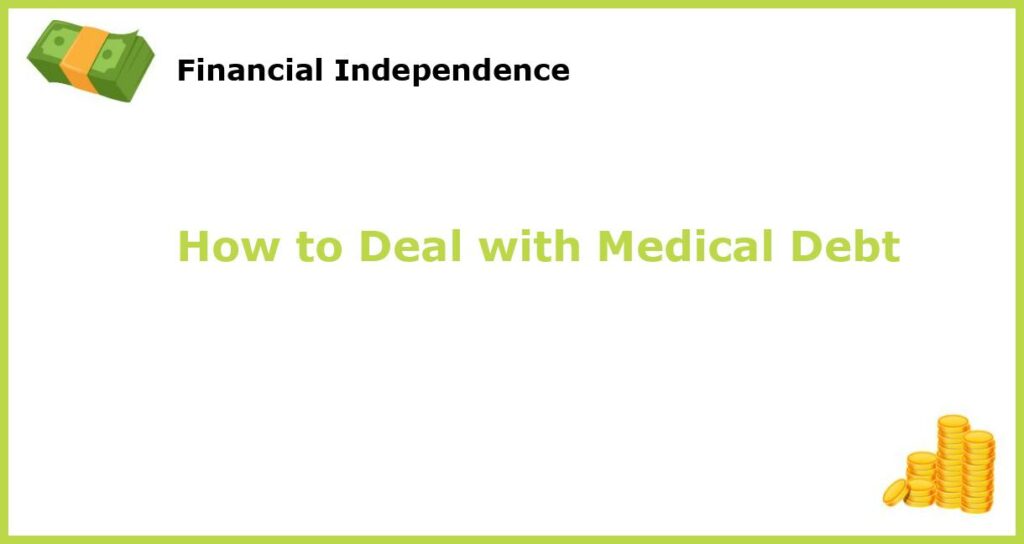Medical debt is one of the leading causes of bankruptcy. It’s a problem that affects many Americans and is hard to deal with. However, there are ways to manage and reduce your medical debt. In this article, we’ll give you ten tips on how to deal with medical debt.
1. Understand Your Medical Debt

Understandably, medical bills can be confusing and stressful. They often come in many pieces, including bills from doctors, hospitals, and labs. The first step is to take a deep breath, then carefully analyze and take note of any discrepancies or errors on your bills. Make sure the services you’re being billed for are accurate, and the costs are reasonable.
If you’re unsure about any part of your bill, call your healthcare provider or insurer to ask for clarification. By understanding your bills, you can avoid paying for services you didn’t receive or that cost more than they should have
2. Negotiate Your Medical Bills

If you find your medical bills too high to pay or you don’t have insurance to cover them, you can negotiate with your healthcare provider or hospital to lower your bills or set up a payment plan.
Be honest with the healthcare provider and explain your financial situation. If you have an urgent medical need, focus on making payments manageable. If you can’t pay the bill upfront, ask if you can set up a payment plan.
Negotiating not only helps you manage the debt; it can also help reduce the impact on your credit score.
3. Ask About Financial Assistance

Many healthcare providers have financial assistance programs for low-income patients or those with high medical bills. These programs offer help in various forms, including reduced bills, payment plans, and even some bill forgiveness.
When you receive your medical bill, call your insurance company or the hospital and ask about these programs. Keep in mind that you may need to provide financial information to help qualify for financial assistance.
Don’t let pride prevent you from asking for help. Seeking financial assistance can help reduce your medical debt load.
4. Consider Medical Debt Consolidation

If you have multiple medical bills, debt consolidation may be a critical option. This involves taking out a loan to pay off your medical debts, then repaying the loan over time.
Consolidation can simplify your payments and lower your interest rates. This can make it easier for you to make payments and manage your debts. When considering the loan’s terms, compare the different options carefully before choosing an option that works for you.
5. Use Credit Cards Carefully

If you have to use credit cards to pay for medical bills, be cautious. High credit balances can damage your credit score and accrue more debt than you can afford.
If you have to use a credit card, look for one with low interest rates. Some credit cards also are tailored for medical expenses, so investigate options. Make a payment plan before using your cards and commit to paying it off as soon as possible.
6. Prioritize Your Bills

Even if it’s hard to pay all of your bills, prioritize which ones to pay first. Medical bills should be at the top of your list because they have serious consequences if they’re left unpaid.
Work with your healthcare provider or insurer to develop a payment plan that works for you. This helps you avoid unnecessary collections and garnishments. By prioritizing your payments, you can manage your finances and ensure that you’re taking care of the most critical expenses.
7. Seek Professional Help

If you’re struggling with medical debt, don’t try to handle it on your own. Consider working with a financial advisor or credit counseling service to develop a plan for managing and reducing your debt.
These services can help you negotiate on your behalf, provide resources and guidance, and even connect you with other financial assistance programs.
Financial advisors can help you evaluate your debt load comprehensively and offer advice on how to manage your finances.
8. Avoid Medical Bankruptcy if Possible
If you’re overwhelmed with medical debt, don’t panic and immediately file for medical bankruptcy. Filing may seem like a good option, but It’s not only that it is tough to get, but it also has long-term consequences for your credit and financial future.
Explore other options, such as negotiation or financial assistance programs to help manage your debt. Bankruptcy should only be used as a last resort.
9. Stay on Top of Your Medical Bills
Don’t let medical bills pile up or go unpaid. Keep track of your bills and payment deadlines, and stay organized as much as possible.
If you’re having trouble keeping up with bills, don’t hesitate to reach out to your healthcare provider or insurer for help. They may be able to provide payment plans or other forms of help to reduce the stress.
10. Prevent Medical Debt in the Future
Some of the best steps to deal with medical debt is to avoid it altogether. Make sure you have adequate insurance coverage, understand your healthcare benefits, and prioritize your health. Avoid missing preventative appointments when possible.
Always strive to maintain good health and work on preventing medical expenses in advance. A healthy lifestyle is one of the best investments you can make for your health and finances.







